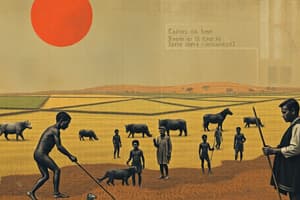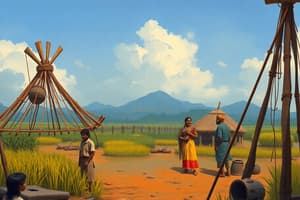Podcast
Questions and Answers
What led to the emergence of social stratification in early societies?
What led to the emergence of social stratification in early societies?
- Increased trade
- Advances in agriculture (correct)
- Widespread literacy
- Development of art
The slavery system in Iron Age empires was primarily established to support technological advancement.
The slavery system in Iron Age empires was primarily established to support technological advancement.
False (B)
What region is known as the center of agriculture around 8000 B.C.?
What region is known as the center of agriculture around 8000 B.C.?
Fertile Crescent
The creation of laws resulted in the creation of __________, warriors, administrators, scribes, and politicians.
The creation of laws resulted in the creation of __________, warriors, administrators, scribes, and politicians.
Match the following agricultural tools with their purposes:
Match the following agricultural tools with their purposes:
What was a primary reason for the need to control the population in early societies?
What was a primary reason for the need to control the population in early societies?
Knowledge of food cultivation spread primarily from the Fertile Crescent to Eastern Europe.
Knowledge of food cultivation spread primarily from the Fertile Crescent to Eastern Europe.
What institution became the most powerful during the medieval period in Europe?
What institution became the most powerful during the medieval period in Europe?
What were the new forms of governance developed to manage food production and societal order?
What were the new forms of governance developed to manage food production and societal order?
Feudalism emerged during the Fall of Rome.
Feudalism emerged during the Fall of Rome.
What was the role of cathedral schools during the Middle Ages?
What was the role of cathedral schools during the Middle Ages?
The Earth revolves annually around the _____ and spins on its axis once daily.
The Earth revolves annually around the _____ and spins on its axis once daily.
Match the following historical sites with their corresponding countries:
Match the following historical sites with their corresponding countries:
What was a major consequence of the fall of the Roman Empire?
What was a major consequence of the fall of the Roman Empire?
The sciences significantly advanced during the medieval period in Europe.
The sciences significantly advanced during the medieval period in Europe.
What architectural styles were prominent during the medieval period?
What architectural styles were prominent during the medieval period?
Which philosopher formalized deductive reasoning?
Which philosopher formalized deductive reasoning?
Francis Bacon advocated for subjective conclusions over rigorous data collection.
Francis Bacon advocated for subjective conclusions over rigorous data collection.
What significant societal change emerged as a result of the Industrial Revolution?
What significant societal change emerged as a result of the Industrial Revolution?
The development of __________ during the Industrial Revolution significantly altered social structures.
The development of __________ during the Industrial Revolution significantly altered social structures.
Match the following figures with their contributions:
Match the following figures with their contributions:
What was one advantage of creating formal institutions during the Industrial Revolution?
What was one advantage of creating formal institutions during the Industrial Revolution?
The 'four idols' warned by Bacon refer to cultural biases that can affect scientific observation.
The 'four idols' warned by Bacon refer to cultural biases that can affect scientific observation.
Name one of the four idols warned by Francis Bacon.
Name one of the four idols warned by Francis Bacon.
What was the primary motivation of the Luddites during the industrial revolution?
What was the primary motivation of the Luddites during the industrial revolution?
The spread of Western science was solely due to trade relations.
The spread of Western science was solely due to trade relations.
Name the three phases proposed by George Basalla in the spread of Western Science.
Name the three phases proposed by George Basalla in the spread of Western Science.
The ________ were textile workers in England during the industrial revolution who protested against new machinery.
The ________ were textile workers in England during the industrial revolution who protested against new machinery.
Match the following phases of Western Science spread to their descriptions:
Match the following phases of Western Science spread to their descriptions:
Which of the following regions received modern science primarily through interactions with Western European countries?
Which of the following regions received modern science primarily through interactions with Western European countries?
The Silk Roads were important for the exchange of both goods and ideas.
The Silk Roads were important for the exchange of both goods and ideas.
What impact did horses introduced to China have on the Mongol Empire?
What impact did horses introduced to China have on the Mongol Empire?
Which disease is known to have spread along the Silk Road?
Which disease is known to have spread along the Silk Road?
The Age of Exploration led to slower routes between the East and West.
The Age of Exploration led to slower routes between the East and West.
What are the two main phases proposed by George Basalla regarding the spread of Western Sciences?
What are the two main phases proposed by George Basalla regarding the spread of Western Sciences?
The studies during Phase 1 predominantly include ______, zoology, and geology.
The studies during Phase 1 predominantly include ______, zoology, and geology.
Match the following phases to their descriptions:
Match the following phases to their descriptions:
Which of the following countries was NOT mentioned as a provider of modern science during the 16th to 17th centuries?
Which of the following countries was NOT mentioned as a provider of modern science during the 16th to 17th centuries?
Phase 2 of the model explored only uncivilized nations.
Phase 2 of the model explored only uncivilized nations.
Name one type of science that was primarily studied during Phase 1.
Name one type of science that was primarily studied during Phase 1.
Flashcards are hidden until you start studying
Study Notes
Early History of Agriculture
- The Fertile Crescent, a region in the Middle East, was the center of agriculture around 8000 BC.
- Knowledge of agriculture spread from the Fertile Crescent to the Mediterranean region and Western Europe, introducing crops like oats, rye, and rice.
- Agricultural advancements led to the development of tools like the hoe, plow, and harrow.
Social Stratification
- Advances in agriculture, particularly food production, fueled social stratification.
- The transition from hunter-gatherer societies to agricultural communities led to the emergence of classes dedicated to administration and governance.
- Early systems of control included managing food supply, maintaining social order, and protecting against calamities.
The Rise of Cities and Empires
- The Bronze Age and Iron Age witnessed the rise of cities and empires across the globe.
- The growth of cities and empires was fueled by advances in agriculture and the development of new technologies, including weapons and tools.
- As societies grew more complex, the need for organized governance, laws, and social structures increased.
Impact of Slavery
- In large Iron Age empires like Rome, slavery played a crucial role in maintaining food production and construction projects.
- The Roman Empire's dependence on slave labor for its economy contributed to its eventual decline and fall.
The Catholic Church in the Middle Ages
- The Catholic Church became the most powerful institution in Europe during the Middle Ages, filling the void left by the fall of the Roman Empire.
- The Church established cathedral schools and universities for training clergy, making it a significant center of knowledge and culture.
- Monasteries also served as centers of learning and cultural development.
- Feudalism emerged during this period, with the Catholic Church playing a vital role in shaping the social order.
Technological Development and the Formalization of Sciences
- The development of technology for practical purposes was a key element in the shift from the Middle Ages to the early modern period.
- The establishment of institutions dedicated to scientific research, like the French Royal Academy of Sciences, formalized science and knowledge generation, paving the way for the Industrial Revolution.
- Scientists like Rene Descartes and Francis Bacon contributed to the advancement of scientific methodology through deductive reasoning and rigorous data collection.
The Spread of Western Science
- The spread of Western science began with contact between Western Europe and other regions through trade, military conquest, colonization, and missionary activities.
- The Silk Road played a significant role in the exchange of goods and ideas between Europe and Asia, contributing to the development of technology and innovations across the world.
- The Mongol Empire's use of horses, introduced from China, and the adoption of gunpowder from China, significantly impacted warfare in Europe and beyond.
- The Age of Exploration led to the creation of faster routes between the East and West, further facilitating the spread of Western science.
George Basalla's Framework
- George Basalla proposed a three-phase model to describe the introduction of Western science to non-European nations.
Phase 1: Natural History
- This phase focused on the exploration and scientific documentation of new lands and their natural resources.
- European explorers collected flora, fauna, and geological specimens, bringing them back to Europe for analysis and scientific understanding.
Phase 2: Colonial Science
- This phase saw the establishment of scientific disciplines and institutions within colonies to strengthen local cultures and national identities.
- Colonies gained access to scientific knowledge and its application, potentially leading to the development of their own scientific traditions.
Phase 3: Independent Science
- At this stage, former colonies develop their own scientific traditions and innovations, separate from direct influence of the colonizers.
- This denotes a shift from reliance on Western science to the establishment of an independent and self-sufficient scientific infrastructure.
Studying That Suits You
Use AI to generate personalized quizzes and flashcards to suit your learning preferences.




